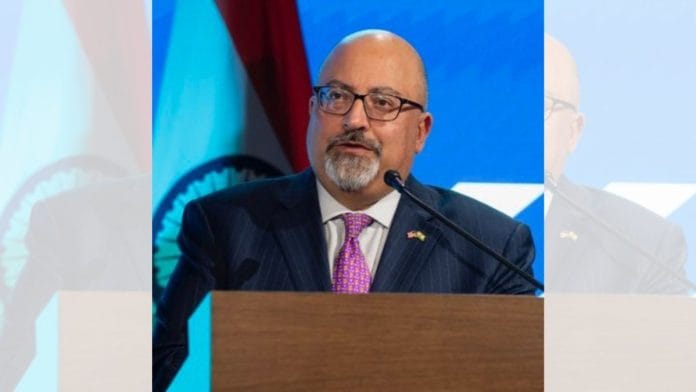New Delhi: The US-India Business Council (USIBC), the premier business advocacy group in the US-India corridor, welcomed India’s 2025-26 Union Budget but stressed the need for deeper reforms to fully unlock the country’s economic potential.
While praising the focus on agriculture, micro, small and medium Enterprises (MSMEs); investment, and exports, USIBC president Atul Keshap, in a statement Saturday, warned that the budget’s goals can only be achieved with lasting changes to India’s regulatory and business environment.
“Foreign direct investment remains steady but has not seen significant acceleration, and businesses continue to navigate complex regulatory landscapes. USIBC urges a more ambitious push for systemic reforms in taxation, regulatory frameworks, and business procedures to further enhance India’s global competitiveness and attract greater investment,” Keshap said.
He also pointed to the announcement of a Rs 20,000 crore allocation for a Nuclear Energy Mission focused on small modular reactors (SMRs), calling it a “commendable” step for energy security.
Finance Minister Nirmala Sitharaman announced amendments to the Atomic Energy Act and the Civil Liability for Nuclear Damage Act, along with the establishment of a Rs 20,000 crore Nuclear Energy Mission for SMRs in the budget. The mission aims to generate 100 gigawatts (GW) of nuclear energy by 2047.
The USIBC, however, stressed that “its long-term success will depend on streamlined regulatory approvals and a clear roadmap for private sector engagement.”
It further noted that, in line with Trump’s focus on fair and reciprocal trade, India should consider more decisive actions to tackle structural obstacles and create a more predictable policy framework that builds investor confidence and fosters long-term strategic partnerships.
In this context, the government’s recognition of critical minerals as a strategic resource, alongside the launch of a National Critical Minerals Mission with a Rs 450 crore allocation for the upcoming fiscal year, was seen by the group as a positive first step. However, it added that more work is needed to establish a fully self-sustaining supply chain.
Also Read: Budget 2025 corrects misguided tax regime of Nehruvian socialism. Changes India’s destiny
Concerns about regulatory framework
While the statement noted that the budget includes several other positive measures, such as a major push for innovation in sectors like artificial intelligence, semiconductors, and advanced computing, there are concerns about India’s broader regulatory framework.
“USIBC, therefore, welcomes the plan to set up a high-level committee for regulatory reforms but urges quick movement to identify and remove regulations detrimental to business,” the USIBC said.
After finance minister Sitharaman Saturday announced tax relief for the salaried class, exempting annual salaries of up to Rs 12.75 lakh from income tax, the USIBC welcomed tax reduction for the middle class as a welcome measure. However, it also pointed to India’s complex tax and regulatory systems as areas in need of significant overhaul, urging the government to adopt a more transparent, predictable approach that would enhance investor confidence.
Similarly, it added that the National Manufacturing Mission, which targets high-value sectors like solar PV cells, EV batteries, motors and controllers, electrolysers, wind turbines, and high-voltage transmission equipment, shows promise but will require stronger policy certainty and a more business-friendly environment to attract the needed investment and technology partnerships.
One of the budget’s highlights for USIBC was the proposal to increase FDI limits in India’s insurance sector from 74 to 100 percent. Sitharaman announced an increase in the FDI limit for the insurance sector, raising it from 74 to 100 percent. She also revealed that the Jan Vishwas Bill 2.0 would be introduced to decriminalise over 100 provisions across various laws.
While the move is seen as a step in the right direction, the USIBC cautioned that a more thorough review of the sector’s regulatory guardrails and conditions would be necessary to fully attract foreign investors.
On trade, Keshap underscored the importance of creating a balanced, transparent environment to facilitate deeper US-India commercial ties. He welcomed the government’s recognition of critical minerals as a strategic asset, noting that India’s ambition for self-reliance in supply chains requires much greater effort to clear the regulatory bottlenecks that currently impede progress.
The statement commended the introduction of Bharat Trade Net and the transformation of India Post into a major logistics player.
It further noted that while the budget includes positive health measures, such as the exemption of 36 life-saving drugs from basic customs duty (BCD), deeper structural reforms in healthcare are needed to address systemic inefficiencies in pricing, regulation, and innovation.
The group also praised India’s focus on innovation, particularly the establishment of a DeepTech Fund of Funds and the geospatial mission aimed at leveraging India’s strong capabilities in data creation and analysis. However, Keshap argued that India must do more to ease regulations in its digital economy to unleash the full potential of private investment and technological advancement.
“Bold, concrete measures are still needed to ease regulations and compliance costs in the digital economy that will unleash the potential of private investment, drive competition, lower barriers to entry, and promote the creative economy,” Keshap said. “Without action, India risks lagging in the global strategic technology race.”
(Edited by Radifah Kabir)
Also Read: Taxman will still come after you. Expect more scrutiny of your tax returns






